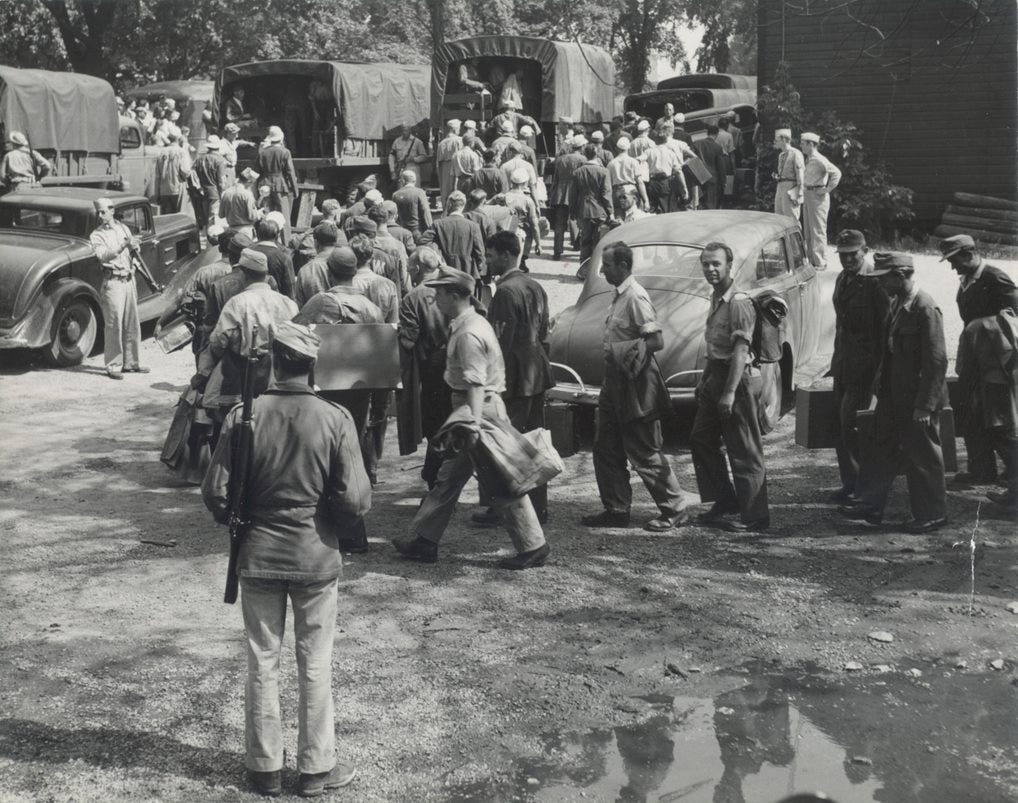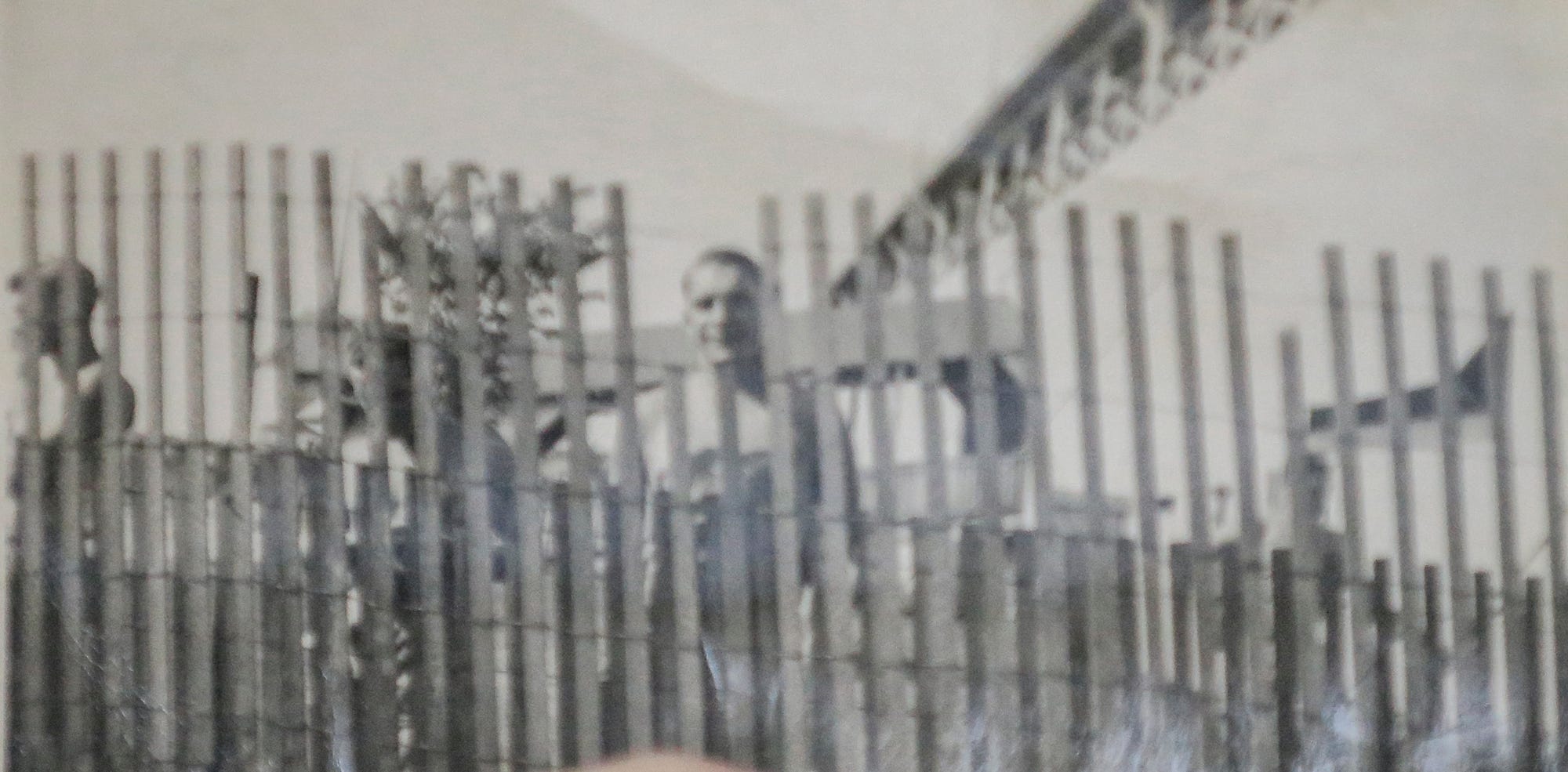Wisconsin residents share stories of POW interactions

Earlier this year, USA TODAY NETWORK-Wisconsin began speaking with people across the state who had memories of German prisoner of war camps or could share memories on behalf of someone who was no longer alive.
The result was dozens of interviews with those who worked alongside the POWs, watched them over snow fences, or had stories passed down to them about the unique World War II experience.
Here is a selection of stories from those in Wisconsin:
“My dad went to Kiel to purchase shoes for the prisoners”
As a child living in Marytown, Sister Joveta Winkel, 85, of Briggsville was told not to speak with the prisoners as they worked the beet fields. But the town was German, so they talked, not about war, but about friendly things neighbors would talk about, she said.
“My dad went to Kiel to purchase shoes for the prisoners, and he paid for them himself. My mother and the other ladies baked pies for them. The spirit was such that those prisoners were almost welcome because of their commonality with small town farmers,” she said.
She recalls one time when the prisoners arrived at the fields by bus, they noticed the guard had forgotten his gun.
“’You better go back and get it,’ the prisoners told him,” Winkel said.
“... They’d get foxy ...”
Edith Kreger of Campbellsport worked with POW’s at Green Giant Canning Company near Beaver Dam. While the vegetables cooked in large vats, the men would sit on benches and watch the “pretty girls” in the nearby packing department, the 91-year-old recalls.
“Once and awhile they’d get foxy and we got a water bath from their side while they were goofing off,” she said. “We were restricted and had no access to them, but I recall having fun at the job, though we had to keep busy.”
Climbing trees and singing “while military police napped”
The notion of a woman supervising cherry pickers may have been controversial at the time, but Faye Isaacson’s father Frank Logerquist insisted she fill the role at his cherry orchard in Sister Bay.
“I checked in the pails the prisoners brought in filled with cherries. They looked young and healthy and happy – kids my own age,” said the 92-year-old. “I will never forget them climbing the trees and singing while the military police napped all day under a tree.”
POW playing with machine gun
George Everson, 90 of Door County recalls the time at his father’s cherry orchard a guard handed his Johnson sub machine gun to one of the POW’s, who commenced to flip the gun around and stand at attention with it, to the horror of his mother. He was 16 years old at the time.
“I thought my mother was going to go into hallucinations, but he calmly handed the gun back to guard and everything went back to normal,” he said. “They were great pickers, filled 20 pails a day, with no stems or leaves.”
“It was the first time I ever saw men wearing shorts”
Maynard Chadwick, 86, of Oakfield, remembers being impressed by the POWs at the age of 12. They were the first men he had ever seen wearing shorts.
The "physically fit” POWs were from the Africa Corps, said another Oakfield resident, 74-year-old James Gelhar. His father managed the factory where the men canned sugar beets. The factory is now the site of Seneca Foods.
Despite their work around the public, the POWs didn’t interact much with them. One of the only interactions Chadwick saw was between the POWs and the Lutheran minister, who traveled to the camp made of tents every Sunday to preach.
“They were good people. The same as our soldiers. But they were on the other side,” said Gelhar.

POW camp brings “an attraction” to Waupun
In Waupun, a nine-year-old Richard “Dick” Rens, now of Arizona, watched the POWS play with his rat terrier dog under a tree during a lunch break from turning hemp on his family’s farm.
About a dozen came to their farm of 1944 to do the work which required turning the plant with a 20-foot pole.
As the POWS worked, Rens brothers fought. One of his brothers was stationed in the Aleutian Islands. Another was stationed in Cherry Point, North Carolina, but killed when he took his friend’s place to go up in a plane. His friend escorted the body home.
Such a close personal connection to the war didn’t dull Rens interest — or that of others in Waupun. Rens remember he and his family, as well as other community members, driving by the camp to see the men.
“There was kind of an attraction for people to look at it,” he said.
A lot of them did not want to go home
Merle Telloch’s father owned Long Acres Stock Farm in the small town of Winchester, just north of Oshkosh during the war. They also planted sugar beets, because it was a commodity that was scarce, and there was a ration placed on sugar. POWs were trucked in to hoe 25 acres of beets.
“At that time the war was still raging and we looked at them like they were evil people,” said the 83-year-old Oshkosh man.
A lot of the German did not want to return home, he said. He learned that from a good friend he did business with in later years who was a deserter of the Germany Army, and was captured by Americans. He eventually moved to the U.S., Telloch said.
Their country was left in ruins
Norman Irish, 89, worked for a farmer from Bavaria who raised potatoes near Antigo, with help from the POWs. After the war he was in the service as a telephone lineman for the Airforce. Irish was stationed near Munich and tasked with helping the country recover.
“Big cities were ruined, and people were living in hovels. There weren’t many men left and women and children were starving, so we gave them the leftovers from our own food,” he said.
He met a girl from Leipzig, fleeing from the Russian takeover of her city. He almost married her, Irish said, but there were religious differences.

Neighborhood kids would stop and jeer
Barb Nett, 82, of Fond du Lac lived near the Fond du Lac County fairgrounds, where the POWs were housed during World War II. Every day, the prisoners would return to camp on a school bus after working in the nearby cannery.
“All the kids in the neighborhood would stop whatever games they were playing and run out to the sidewalk and jeer and boo as the buds went by,” Nett said. “The POWs would just smile and wave at us. They knew how good they had it.”
Lard sandwiches wouldn’t do
Ruth Barrette, 87, of Janesville was 15 years old when her family owned a cherry orchard in Door County during the war. She roamed freely among the POWs as they worked and they shared with her their daydreams of dating girls and taking them for walks through the park back home, she said. One POW told her he wished he was the famous big band leader Harry James because he was married to the pin-up girl, actress Betty Grable.
“We could see that every day they brought lard sandwiches with them, so my dad would sometimes bring lunch meat and my uncle would bring them cigarettes and candy,” she said. “They all doted on my little brother, especially the ones who had a family of their own back home, because he was very blonde with blue eyes.”